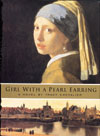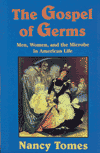| |
|
Please
send news of your recently published book along with a review copy,
if possible, to "Bookshelf," Oberlin Alumni Magazine.
Your
review copy will be presented to the Oberlin College Library as
a gift from you.
 Girl
With a Pearl Earring Girl
With a Pearl Earring
by Tracy Chevalier
'84
Dutton, 1999
Reviewed
by David Young
I will admit,
first off, to a bias in favor of novels that successfully recreate
historical periods and to historical novels dealing with art history
in particular. I enjoyed The Lost Diaries of Frans Hals,
a first novel by Michael Kernan, a few years back, and, more recently,
Michael Frayn's Headlong, in which I learned a great deal
about Bruegel. Both of these novels juxtaposed a contemporary setting
with an historical period, whereas Tracy Chevalier's second novel
is set squarely and purely in 17th century Delft. From it I learned
a good deal about what it was like to be a lower class young woman
of the time, as well as how painters worked: how they got commissions,
planned compositions, used the camera obscura, ground their colors,
and, in Johannes Vermeer's case, grew obsessed with perfection.
The book brings its world to life with unobtrusive skill. As you
read it, you'd do well to have a volume of Vermeer reproductions
at your elbow. You'll be rewarded doubly.
Vermeer's greatness is both convincing and enigmatic in this careful
portrait of his work and his world. Because we see him through the
eyes of Griet, the 16-year-old servant who comes to work in his
house and gradually becomes a sort of secret assistant to him, we
understand him only as much as she does, which is partially. He's
a closed book to her--a master, an adult, a taciturn craftsman absorbed
by his craft--and the mystery of getting to know him is wound round
the story of her own difficult growing up. Griet is a wonderful
character, in a poignant situation, and seeing the world through
her eyes is something I would not trade for a chance to tune in
on the thoughts or feelings of Vermeer himself. I accept Tracy Chevalier's
terms and conditions fully. In my view this novel, which is having
a considerable success, deserves its critical praise and growing
popularity.
ABOUT THE
AUTHOR: Raised in Washington, D.C., Tracy Chevalier '84, moved
to London in 1984 as a literary editor for a reference book publisher.
She earned an MA in creative writing at the University of East
Anglia in Norwich in 1994, and published her first novel, The
Virgin Blue, chosen by W. H. Smith for its Fresh Talent promotion
in 1997. Today she lives in London with her husband and son and
is working on a third novel, set in London at the beginning of
the 20th century.
"I wrote this book because I have always been fascinated with the
Dutch painter Johannes Vermeer's works, especially the painting
Girl With a Pearl Earring," she writes. "I am never sure
what the girl in it is thinking: sometimes she looks seductive,
other times sad. Sometimes she is 13 years old, other times 30.
I began to wonder what Vermeer said or did to make her look like
that, and from that wondering the story emerged."
David
Young is the Longman professor of English and Creative Writing.
 Arts
& Crafts Textiles: The Movement in
America Arts
& Crafts Textiles: The Movement in
America
By Ann Wallace '71
Gibbs Smith, 1999
An introduction
to American arts and crafts textiles is a subject that has only
recently gained recognition for its unique contribution to popular
decorative style. Arts & Crafts describes the development
of textile design in the United States and explores how textiles
were used in homes in the first part of the century. The author
provides tips and color photographs for collectors and illustrated
instructions for textile care. Wallace recently moved to Los Angeles,
where she runs a textile design business.
 Red
Jacket: Iroquois Diplomat and Orator Red
Jacket: Iroquois Diplomat and Orator
By
Christopher Densmore '71
Syracuse
University Press, 1999
Tried as a
witch by his own people, feared by European monarchs, and accused
of betraying the very nation he represented, Iroquois diplomat
Red Jacket led a tumultuous life. Densmore has written the first
modern biography of this controversial Native American who served
from the 1770s through the early 1800s as the Iroquois representative
in land negotiations with the U.S. So iconic a figure was Red
Jacket that 20 years after his death in 1830, his bones were stolen
while debate raged as to whom, Indians or whites, they belonged.
Densmore is the director of university archives at SUNY-Buffalo
and has written articles for New York History, Quaker History,
and other journals.
 Open
and Clothed: For the Passionate Clothes Lover Open
and Clothed: For the Passionate Clothes Lover
By Andrea Siegal '84
Agapanthus Books, 1999
Clothes
junkies, shoe-aholics, and the wardrobe-obsessed find themselves
undressed, emotionally, in this book. Siegal offers readers an
appealing mosaic of culture, personal history, and advice by interviewing
clothing lovers, researching costumes, and investigating museums
throughout the world. Quoting Joan Rivers and Karl Marx in one
breath, she takes her readers on a whirlwind tour of the joy and
pain of clothes obsession. Siegal lives in Queens, where she continues
to write and to practice the Feldenkrais Method, a type of body
work therapy.
 The
Gospel of Germs: Men, Women, and the Microbe in American Life The
Gospel of Germs: Men, Women, and the Microbe in American Life
By Nancy Tomes '74
Harvard University Press, 1999
AIDS.
Ebola. Every day the media come out with reports of newer, deadlier
diseases. Yet, as Tomes writes, this is really nothing new. This
medical and cultural history takes us back to the early 1900s
to explore the origins of our modern disease consciousness. Full
of fascinating detail, this work charts the American "revolution
in personal hygiene" that helped create a safer environment even
as it produced new prejudices about sickness and health. Tomes
is professor of history at SUNY-Stony Brook and the author of
The Art of Asylum-Keeping: Thomas Story Kirkbride and the Origins
of American Psychiatry.
|